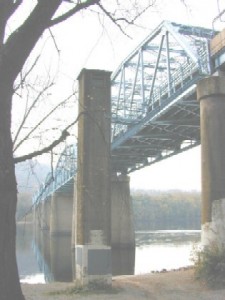Flows were a little lower at Point of Rocks station, but have improved.

The water gage in the Potomac River at Point of Rocks (photo from ICPRB)
Rockville, Md (KM) The Interstate Commission on the Potomac River Basin is keeping a close eye on the Potomac River during this time of moderate drought.
Last Monday, the river flow measured as measured at the gage at Point of Rocks dropped below 2,000 cubic feet per second, and the Commission began daily drought monitoring. But the recent rains have increased the river’s flow, and daily drought monitoring was discontinued.
Michael Nardolilli, the Executive Director of the Interstate Commission on the Potomac River Basin, says this is the earliest that ICPRB started drought monitoring as that normally takes place during July and August. . “It happens about once every 20 years at this point in the summer,”: he says. “And we’ve have four notable basin-wide droughts in the past 100 years: 1930, 1966, and more moderate droughts in 1999 and 2002,” he says.
Nardolilli acknowledges that drought monitoring could resume later this summer if there’s no appreciable rain in the near future. But in the meantime, he says there is no danger in the region for municipalities which rely on the Potomac as their source of drinking water. “Flows have been low, but sometimes we get a very significant amount of rainfall, and oftentimes it’s connected with a tropical storm,”: he says.
If the water level drops too low, Nardolilli says water can be released from the Jennings Randolph, Little Seneca and/or Savage reservoirs located upstream. “We have calculated at a 19 percent to 34 percent of a likelihood of reservoir releases,”: he says. “So we haven’t done it yet.”
“And if such releases were necessary in the storage, and reservoirs began flowing, the regional governments would being to consider calling for water use restrictions in coordination with the Metropolitan Washington Council of Governments,” Nardolilli adds.
But we’re not there yet.
In the meantime, Nardolilli says there are actions residents can take to conserve water. They include turning off the faucet while brushing their teeth, taking shorter showers, fixing leaky pipes and having their cars washed at a local car wash rather than doing so at home.
“Conservation measures always help, especially in a dry period like the summer,” he says.
By Kevin McManus